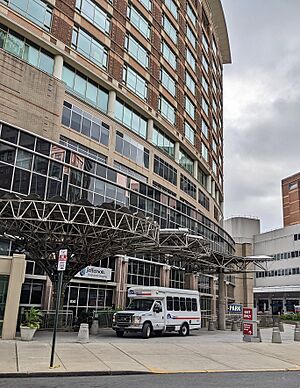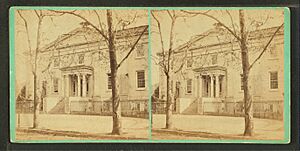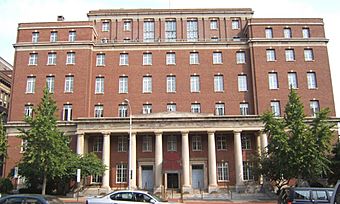Wills Eye Hospital facts for kids
Quick facts for kids Wills Eye Hospital |
|
|---|---|
 |
|

Wills Eye Hospital outpatient entrance
|
|
| Geography | |
| Location | 840 Walnut Street, Philadelphia, Pennsylvania, United States |
| Organization | |
| Hospital type | Specialist |
| Affiliated university | Thomas Jefferson University |
| Services | |
| Speciality | Ophthalmology |
| History | |
| Founded | 1832 |
Wills Eye Hospital is a special hospital in Philadelphia, Pennsylvania, that focuses only on eye care. It's a non-profit hospital, which means it uses its money to help people, not to make a profit. Founded in 1832, it is the oldest eye-care hospital that has been open continuously in the United States. It also works with Thomas Jefferson University to train new eye doctors.
Since 1990, Wills Eye Hospital has often been named one of the top three eye hospitals in the U.S. by U.S. News & World Report. Its training program for eye doctors is also considered one of the best and most competitive in the world.
Contents
History of Wills Eye Hospital
How Wills Eye Hospital Started
Wills Eye Hospital was founded thanks to a generous gift from James Wills Jr. He was a Quaker merchant who left $116,000 in 1832 to the City of Philadelphia. Mr. Wills wanted the money to be used specifically to help people who were poor, blind, or had trouble walking.
Over time, the hospital became focused only on eye care. The first Wills Hospital opened in 1834. It was located on Logan Square at 18th & Race Streets in Philadelphia.
Early Doctors and Their Work
Many important surgeons worked at Wills Eye in its early days. These included Isaac Parrish, M.D., and Isaac Hays, M.D. George Fox, M.D., and Squier Littell, M.D., also worked there. In 1837, Dr. Littell wrote a book called "A Manual of Diseases of the Eye." Later, in 1854, he also helped edit another important book about eye surgery.
Historic Building of Wills Eye Hospital
The Centennial Building of Wills Eye Hospital was designed by architect John T. Windrim. It was built between 1931 and 1932. This building is six stories tall and made of brick.
The front of the building has a special entrance with eight large columns. This building is no longer a hospital. It has been changed into residential apartments. In 1984, this historic building was added to the National Register of Historic Places. This list includes important places that are worth preserving.
Medical Achievements and Innovations
Wills Eye Hospital has been a leader in developing new ways to treat eye problems. They have pioneered many important techniques in the field of eye care. Some of their key achievements include:
- Artificial Lens Implant (1952): Doctors Warren Reese and Turgut Hamdi were among the first to use an artificial lens inside the eye. This helped people see better after cataract surgery.
- Vitrectomy Machine (1972): Dr. Jay Federman invented a special machine called a vitrectomy machine. This machine helps surgeons remove parts of the eye's jelly-like substance (vitreous) to treat certain eye diseases.
- Artificial Retinal Implant (2009): Doctors Julia Haller, Allen Ho, and Carl Regillo helped develop an artificial retinal implant. This amazing technology can help some people with severe vision loss to see again.
Notable People at Wills Eye Hospital
Many famous and important people in eye medicine have been connected to Wills Eye Hospital.
- Charles D. Kelman, MD (1956–1960) is known as the "father of phacoemulsification". This is a modern method of cataract surgery. He also invented the cryoprobe, a tool that uses extreme cold for surgery.
- Other notable doctors include David Hayes Agnew, Harrison Allen, Jerry A. Shields, Carol Shields, George Spaeth, William Tasman, and Santosh G. Honavar. These individuals have made significant contributions to eye care.
Senior Officials
- Joseph Bilson has been the Executive Director of Wills Eye since 2007.
- Julia A. Haller, MD, has been the Ophthalmologist-in-Chief at Wills Eye since 2007. She is the top eye doctor at the hospital.






